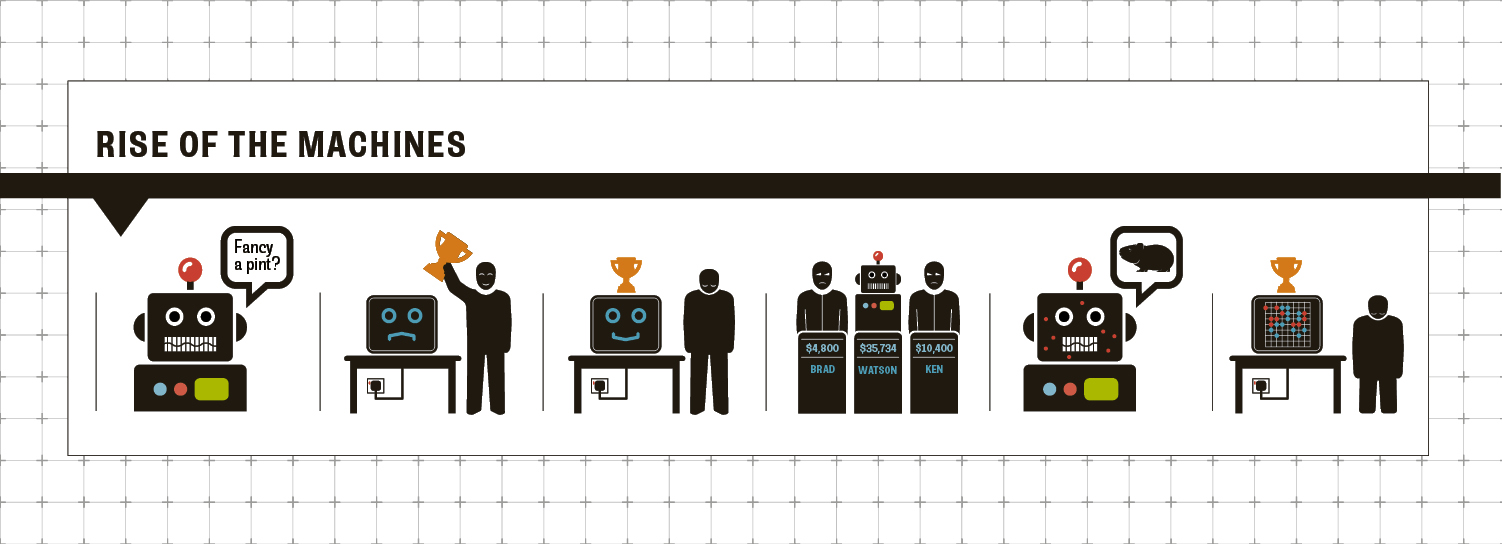At the end of the fifth and final match, Lee Sedol sat back quietly in his chair in a conference room at the Four Seasons Hotel in Seoul as the collected computer scientists celebrated around him.
Lee, second only to fellow South Korean Lee Chang-Ho in international titles in the ancient Chinese board game of Go, put up a valiant fight against the machine, AlphaGo, created by Google’s DeepMind division. AlphaGo had erred early on, but recovered to overpower the human and win the series four to one. Board games have been used since the early days of artificial intelligence research as ways to measure progress — IBM’s Deep Blue famously beat world chess champion Garry Kasparov in New York in 1997 — and AlphaGo’s victory marks another significant milestone in the advancement of the technology.
Go presents a far greater challenge to AI than chess. The game is so complicated that calculating its maximum number of possible permutations required the creation of whole new concepts in mathematics. On a 19 x 19 board, there are 10700 — 1, with 700 zeroes — possible outcomes of Go. Chess, by comparison, has a “game tree complexity” of 10120.
However, while Go may be “the Everest” of board games, it is not a particularly good analogue for real-world decisions, according to Toby Walsh, an expert in AI from the University of New South Wales.“It’s an interesting marriage of very human-like things, like learning and perceiving what are good moves, and the very computer-like way that it then explores this big tree of possibilities,” Walsh says.
AlphaGo’s achievement is as much a commercial milestone as it is a technological one. AI research was mainly publicly funded throughout the 20th century. Today it is largely the preserve of the technology giants. Apple, Google, Amazon and Facebook have all spent heavily on an AI arms race, as they look for new ways to mine, shape and interpret the vast data sets that they are amassing on a daily basis. In February, Google appointed an AI expert, John Giannandrea, to oversee its search algorithms. The company reportedly paid more than £400 million to acquire the British start-up DeepMind in 2014.
AI’s uses in creatively interpreting data and forming conclusions are wide-ranging, and in many cases hugely exciting for the future of health and scientific research. Watson, a question-answering algorithm that won the US quiz show Jeopardy! in 2011, was put to work — albeit for money — helping doctors to make diagnoses, by mining masses of data from medical journals to give them access to a breadth of information they could never otherwise digest.
However, Walsh warns that the privatisation of the AI arms race means that the public may ultimately not be able to use the fruits of this research.“I think it’s quite worrying in some ways that only the rich can profit from these things. Even in a university, I don’t have access to the computational resources that Google has access to,” he says. “There is a worry that they are the only ones going to end up owning this technology.”

1950
Alan Turing proposes that for a machine to be classified as intelligent, it must be able to hold a conversation that is indistinguishable from a human interlocutor. The Turing Test becomes a benchmark for the development of AI.
1996
World chess champion Garry Kasparov beats IBM supercomputer Deep Blue 4-2 in Philadelphia.
1997
Deep Blue defeats Kasparov 3½ to 2½ in a rematch in New York, the first time that a computer had beaten a reigning world champion under tournament conditions.
2011
IBM’s Watson beats Brad Rutter and Ken Jennings, two champions at Jeopardy!.
2014
“Eugene Goostman”, an AI pretending to be a Ukrainian teenager with a pet guinea pig, passes the Turing Test in an event at the Royal Society.
2016
Google DeepMind’s AlphaGo programme beats Lee Sedol at Go 4-1 in Seoul.
Illustration: Matt Ward

